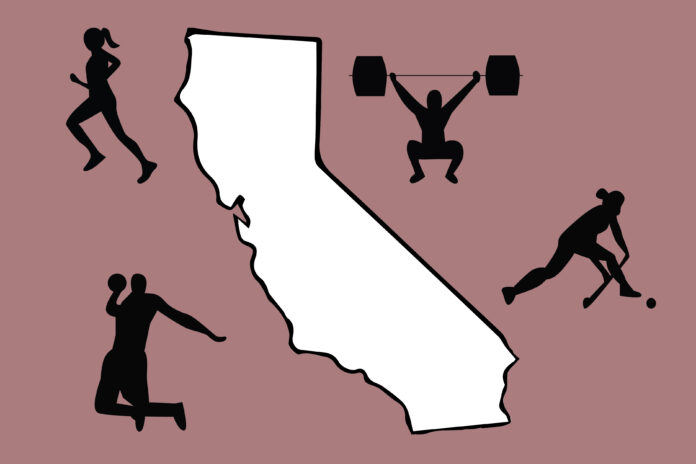Fair Pay to Play Bill becomes law
After much talk and anticipation, California Governor Gavin Newsom signed Senate Bill 206 on Sept. 30, allowing college athletes in the state to profit off of their own name, image and likeness starting in 2023. The formal signing of the bill was completed on HBO’s “The Shop,” hosted by NBA star Lebron James.
“I don’t want to say this is checkmate, but this is a major problem for the NCAA,” Newsom said on the show. “It’s going to initiate dozens of other states to introduce similar legislation, and it’s going to change college sports for the better by having now the interest, finally, of the athletes on par with the interests of the institutions. Now, we’re re-balancing that power arrangement.”
Newsom added that many university presidents and athletic boosters in the state of California contacted him and urged him to veto the bill but he felt strongly that “the state needed to address the racial, gender and economic injustices ingrained in college athletics.”
This bill has the potential to change college athletics and the NCAA as we know them, as discussed in The California Aggie two weeks ago. Not only was the NCAA against the bill, but many schools in California tried to pressure the Governor into vetoing it. Now, the NCAA has to prepare for change, whether they wanted it or not.
The NCAA apparently believes that “changes are needed” in order to support student-athletes, but that “improvement needs to happen on a national level through the NCAA’s rules-making process,” according to a statement released by the organization on Sept. 30.
“Unfortunately, this new law already is creating confusion for current and future student-athletes, coaches, administrators and campuses, and not just in California,” the statement continued. “As more states consider their own specific legislation related to this topic, it is clear that a patchwork of different laws from different states will make unattainable the goal of providing a fair and level playing field for 1,100 campuses and nearly half a million student-athletes nationwide.”
The NCAA was not alone in showing its displeasure, as the PAC-12 Conference also released a statement that same day.
“The Pac-12 is disappointed in the passage of SB 206 and believes it will have very significant negative consequences for our student-athletes and broader universities in California” the statement reads. “Our universities have led important student-athlete reform over the past years, but firmly believe all reforms must treat our student-athletes as students pursuing an education, and not as professional athletes. We will work with our universities to determine next steps and ensure continuing support for our student-athletes.”
From now until the time the law goes into effect in 2023, California and the NCAA will have to work together to reach a consensus on how to move forward. The NCAA might get to a point where it will have no choice but to succumb to the pressure and change its own rules, as several other state legislatures have recently introduced, or plan to introduce, similar legislation dealing with student-athlete compensation. As of Oct. 2, this total is up to as many as nine states, including Pennsylvania and New York, according to Sports Illustrated. Florida Representative Kionne McGhee (D) filed a bill shortly after SB 206 was announced. If passed, the bill would go into effect July 1, 2020, which is currently the soonest date of any state.
Although 2023 is still a ways away, recruitment of student-athletes can begin years before they enroll in the school. The fear of the NCAA is that California now has a greater advantage and, starting in 2023, will attract the best recruits in the country who want to get paid.
Every major change has its beginnings. For Fair Pay to Play, it seems to have its beginning in the state of California.
Written by: Omar Navarro — sports@theaggie.org










